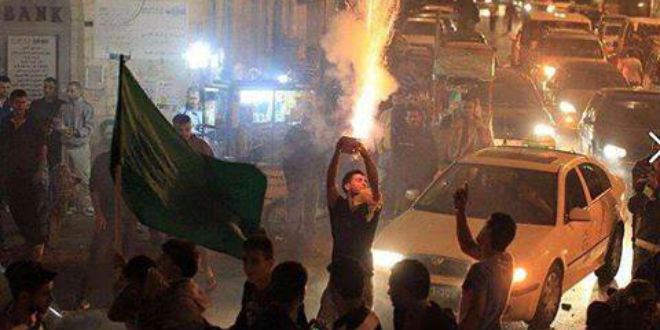FRESH AIR
UPDATES
Palestinians Celebrate Terror Attacks- Again
June 17, 2016 | Aaron Torop

As we have reported on this blog in the past, large elements of the Palestinian leadership and much of the Palestinian public routinely celebrate terror attacks. The June 8 shooting in Tel Aviv that killed four is no different. Similar to responses after the Jerusalem bus bombing this past April, many parts of Palestinian society welcomed this most recent attack.
Hamas hailed the two gunmen as “heroes” on Twitter and on June 9 it confirmed that both attackers were members.
Hamas spokesman Hussam Badran called the attacks “the first prophecy of Ramadan,” “a good omen,” and just the beginning of the “surprises” during Ramadan. The terrorist organisation called the attack a message to the “leaders of the occupation” and to new Israeli Defence Minister Avigdor Lieberman, who took office last week.
Hamas cited the “desecration of the Al-Aqsa Mosque and crimes against the Palestinian people” as supposed justification for the attack, but did not name any specific incidents. It further called Ramadan, the Muslim holy month, “a month of Jihad, fortification, and victory over the enemy,” intimating attacks will continue.
Hamas also released a video mocking the attack, showing an Arab man dressing up in religious Jewish clothing and loading a gun, ending the video with “[the gunman] covered in blood with the quote ‘reward is certain, if Allah wills it,’ a Muslim blessing upon the breaking of the fast,” according to The Jerusalem Post. To watch the whole video, CLICK HERE.
Mahmoud Abbas, President of the Palestinian Authority, offered a general statement expressing “opposition to any operation that harms civilians by anybody, regardless of the justifications.” However, he did not explicitly condemn this attack. This statement continues Abbas’ practice of not directly encouraging attacks, but also not directly condemning them, which he has followed since the beginning of the current round of terrorist violence that began last October. Palestinian Media Watch has an insightful side-by-side comparison noting the difference in tone when Abbas condemned a terror attacks on Jordanians as compared to his comments on Israelis.
Abbas’ Fatah party justified the attack on its official Facebook page as a “natural response” to Israeli policy, saying that, “Israel must realize the consequences of its persistence to push violence.” This continues Fatah’s ongoing support of terrorist attacks on Israel, as PMW notes.
The Popular Front for the Liberation of Palestine (PFLP) echoed the comments of both Hamas and Fatah, calling the attacks a “natural response” to the killing of Palestinians, and a message against the appointment of Lieberman.
Palestinian Islamic Jihad threatened more attacks, saying that the Jerusalem Intifada will continue.
The Palestinian people also openly celebrated the attack. Reports of fireworks, spontaneous victory marches, cheering, and the passing out of sweets in both Palestinian territories and refugee camps have emerged in the past week. They also took to social media, using hashtags on Twitter and Instagram such as #Ramadan operation and #carlos bullet.
Other Palestinians referenced Iftar, the meal that breaks the fast during Ramadan, with the hashtag #We broke the fast killing them.
The fact that many of the comments made by both Hamas and Palestinian people reference the start of Ramadan should be troubling to Israel. These comments suggest that more attacks will come during this Muslim holy month – which lasts until July 5. The Times of Israel notes that Ramadan is typically accompanied by heightened tensions.
Meanwhile, against a backdrop of a conference on Middle East peace in Paris on June 3, Egypt’s willingness to be involved in peace negotiations, and Netanyahu’s recognition (but not acceptance) of the Arab Peace Initiative and reaffirmation of his commitment to a two-state solution, Palestinian news anchor for Al Jazeera Sakna al-Jamal wrote, “the Ramadan operation… is the best answer to stories we have been hearing about ‘peace process.'”
Additionally, a comedy show on Al Jazeera mocked the Tel Aviv shooting and criticised an Egyptian journalist for condemning the attack.
Yet Saudi Arabia, not exactly a traditional friend of Israel, came out strongly to condemn the attacks, with a member of the Saudi Journalists Association calling the attack “terror and thuggery.” UN General Secretary Ban Ki-moon, meanwhile, said he was “shocked that the leaders of Hamas have chosen to welcome this attack and some have chosen to celebrate it.”
The continued support of violence by the Palestinians may be one of the most important obstacles to two-state peace. While Israel remains committed to a two-state resolution and the Arab world may move closer to supporting peace and stability in an increasingly unstable region, most Palestinians appear to remain dedicated to violence, so the reactions to this attack are perhaps not surprising, according to research cited by Israeli academic Dan Polisar.
He noted that the Palestinian Centre for Policy and Survey Research, in a poll conducted at the beginning of June, found that 65% of Palestinians supported April’s Jerusalem bus bombing.
Polisar wrote that, “High percentages of Palestinians have supported terror attacks on Israeli civilians in general, while even higher percentages have backed specific bombings and shootings.” He notes that over the past fifteen years, with only a few small exceptions, support for successful attacks have been higher than support for attacks in principle.
Given the widespread support for attacks on Israel as demonstrated by the above statements, more violence, at least through Ramadan, looks likely – while any hopes for progress toward peace look slim. If the Palestinian Authority is truly interested in negotiating peace, and achieving eventual co-existence in two-states, encouraging or condoning violence against innocent civilians is a very good way to sabotage any such hopes.
Aaron Torop
Tags: Israel
RELATED ARTICLES

‘Time’s up for talk’: Joel Burnie discusses Antisemitism Envoy’s report on Sky News

‘Optimism’ for Hamas to ‘exile’ their power and create a permanent ceasefire with Israel: Joel Burnie on Sky News

Australian government’s response to Iran-Israel conflict ‘disappointing’: Paul Rubenstein on Sky News




















